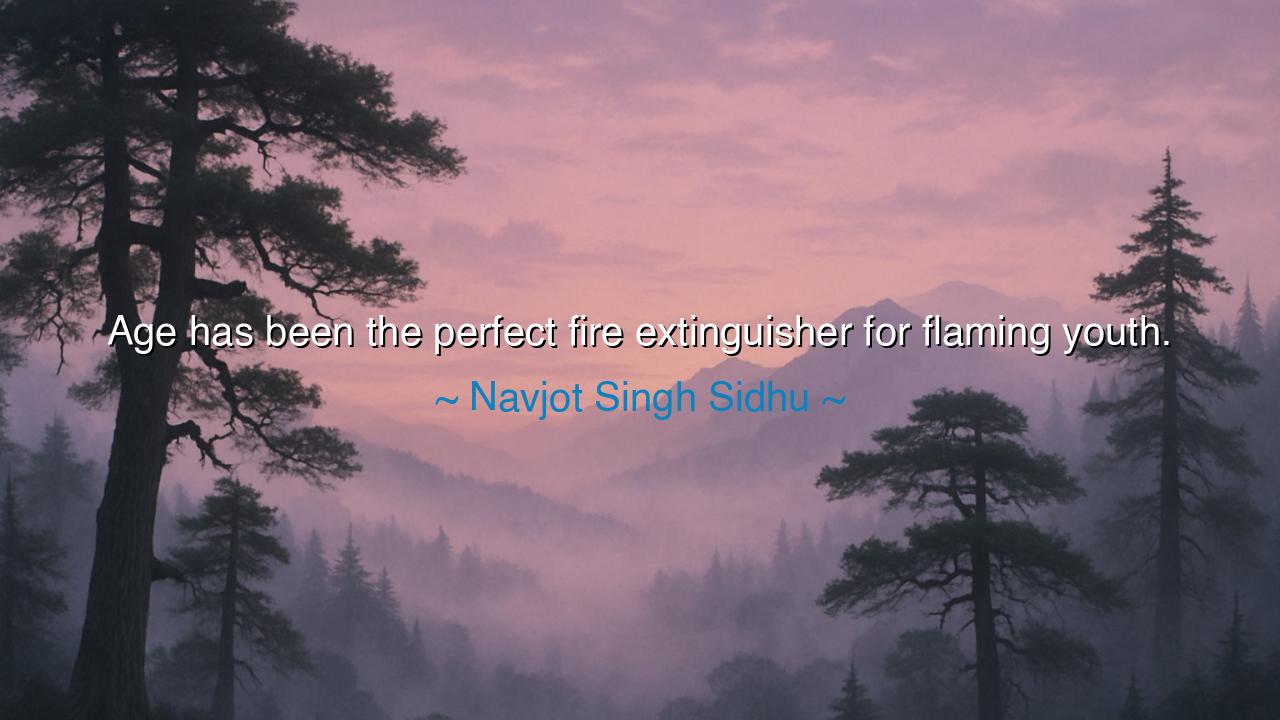
Age has been the perfect fire extinguisher for flaming youth.






"Age has been the perfect fire extinguisher for flaming youth." — so declared Navjot Singh Sidhu, the cricketer, commentator, and philosopher whose words, though wrapped in humor, burn with the heat of truth. In this quote, Sidhu captures one of life’s most profound transformations — the cooling of youth’s fire by the quiet waters of age. What begins as passion and impulsive energy, wild and blazing, is gradually tempered by the lessons of time. The fire of youth, though brilliant, is often reckless; and age, like a gentle rain, teaches restraint, patience, and wisdom. Yet in this cooling, there is not loss, but refinement — for the flame that once burned outward becomes an inner light.
In the manner of the ancients, one might say: the river that rushes in its youth carves the valleys through which wisdom later flows. Sidhu’s words remind us that every human life is a dance between passion and prudence, between the heart that burns and the mind that understands. In the dawn of youth, we seek to conquer the world; in the twilight of maturity, we seek to understand it. Thus, age, far from extinguishing the fire of life, transforms it — from the flame that consumes to the flame that illuminates.
Navjot Sidhu, known for his spirited speech and wit, speaks here not as a comedian but as a philosopher forged in the fires of experience. His youth on the cricket field was fierce and untamed — full of ambition, pride, and drive. But with the passing of years, and the trials of public life, he discovered what all must learn: that energy alone is not greatness, and that the power of endurance lies in calmness, not chaos. Age, to him, was not the enemy of passion, but its purifier. It extinguished the flaming pride of youth, but in its place, lit the steady lamp of wisdom — a flame that no wind can quench.
Consider the life of Alexander the Great, who by thirty had conquered the known world, yet died before he could conquer himself. His flaming youth burned too fiercely; his fire, unchecked by moderation, consumed the very vessel that held it. Compare this with Marcus Aurelius, the philosopher-emperor of Rome, who, through the discipline of age and thought, learned to rule both his empire and his soul. Where Alexander’s passion destroyed him, Aurelius’ patience preserved him. Thus, in every age and life, youth is the fire, and age the vessel that gives it shape.
Yet let us not mistake Sidhu’s metaphor as mere resignation. To say that age is an extinguisher is not to mourn, but to celebrate transformation. The passions of youth, once reckless, find purpose through reflection. The energy that once sought glory now seeks peace; the ambition that once yearned to possess now learns to appreciate. Age teaches that the brightest fires do not always burn the longest, and that to endure is the truest form of greatness. In this way, life’s second half becomes not a fading, but a refining — the tempering of iron into steel.
The lesson, then, is to welcome the cooling touch of age with grace. Do not cling to the flames of youth, for they were meant to ignite your journey, not to light it forever. Instead, learn to transform your fire into warmth — to turn speed into direction, impulse into wisdom, and desire into compassion. For those who resist this change live as perpetual exiles from themselves, but those who embrace it become like hearths — steady, enduring, and life-giving to others.
And so, my child, remember Sidhu’s wisdom: life’s fire need not burn you to define you. Youth is the spark that begins the journey, but age is the keeper of the flame. Rejoice not only in the heat of your beginnings, but in the steady light of your becoming. For when age extinguishes the wild blaze of youth, it does not end your fire — it perfects it, turning passion into power, and fleeting brilliance into eternal glow.






AAdministratorAdministrator
Welcome, honored guests. Please leave a comment, we will respond soon